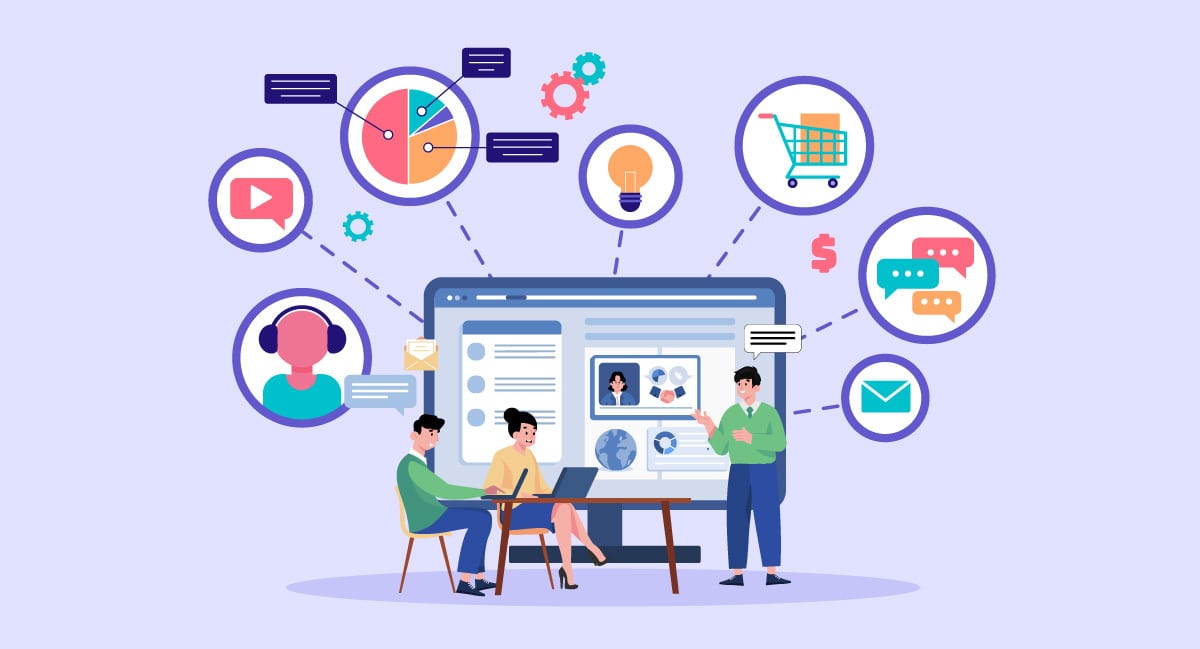Customer Relationship Management (CRM) software has evolved significantly over the years, becoming indispensable tools for businesses across various industries. In 2024, the landscape of CRM software continues to expand, offering specialized solutions tailored to meet the unique needs of different sectors. This article explores 10 industry-specific use cases of CRM software, highlighting the tools that are leading the way in each field.
1. Retail
In the retail sector, CRM software plays a crucial role in enhancing customer experience and driving sales. Retail-specific CRM tools like Salesforce Commerce Cloud and HubSpot CRM enable businesses to track customer interactions across multiple channels, personalize marketing campaigns, manage inventory effectively, and analyze sales trends. These tools integrate with e-commerce platforms, POS systems, and loyalty programs to provide a seamless shopping experience and foster customer loyalty.
2. Healthcare
CRM software has revolutionized patient care and relationship management in the healthcare industry. Solutions such as Healthgrades CRM and Cerner Patient Relationship Management help healthcare providers streamline patient communications, manage appointments, and personalize treatment plans. These tools adhere to healthcare regulations (such as HIPAA compliance) and integrate with electronic health records (EHR) systems to ensure data security and continuity of care.
3. Financial Services
CRM software is instrumental in the financial services sector for managing client relationships, improving customer satisfaction, and increasing cross-selling opportunities. Platforms like Salesforce Financial Services Cloud and Microsoft Dynamics 365 for Financials offer features such as wealth management tools, client portfolio management, and compliance tracking. These CRM solutions help financial advisors and institutions deliver personalized financial advice, track client interactions, and maintain regulatory compliance.
4. Hospitality
In the hospitality industry, CRM software enhances guest experience and operational efficiency. Tools like Oracle Hospitality CRM and Guestline CRM enable hotels, resorts, and restaurants to manage guest reservations, personalize guest preferences, and streamline front-office operations. Integrated CRM solutions also facilitate marketing campaigns, loyalty programs, and feedback management to improve guest satisfaction and retention.
5. Real Estate
CRM software has become essential for real estate agents and agencies to manage client relationships, track property listings, and streamline sales processes. Real estate-specific CRM tools such as Zillow Premier Agent and Top Producer CRM provide features like lead management, automated follow-ups, property search integration, and transaction management. These tools help real estate professionals nurture leads, coordinate with clients and partners, and close deals more efficiently.
6. Manufacturing
CRM software in manufacturing helps streamline sales processes, improve customer service, and manage supply chain relationships. Platforms like Infor CRM and SAP CRM for Manufacturing offer functionalities such as sales pipeline management, customer service ticketing, and order tracking. These CRM solutions integrate with ERP systems to provide a comprehensive view of customer interactions and production workflows, enabling manufacturers to optimize operations and enhance customer satisfaction.
7. Technology
CRM software is pivotal in the technology sector for managing complex sales cycles, supporting subscription-based models, and driving customer success. Tools like Freshworks CRM and Pipedrive for SaaS provide features such as sales automation, customer onboarding workflows, and churn prediction analytics. These CRM solutions help technology companies streamline sales operations, improve customer retention rates, and scale their business effectively in competitive markets.
8. Education
CRM software is increasingly adopted in the education sector to manage student relationships, improve enrollment processes, and enhance alumni engagement. Education-specific CRM tools such as Ellucian CRM and CampusNexus CRM support functionalities like student recruitment, admissions management, fundraising campaigns, and alumni relations. These CRM solutions integrate with learning management systems (LMS) and student information systems (SIS) to provide educators and administrators with insights into student lifecycle management and institutional effectiveness.
9. Nonprofit
CRM software plays a critical role in nonprofit organizations by managing donor relationships, fundraising efforts, and volunteer engagement. Platforms like Blackbaud CRM and Salesforce Nonprofit Cloud offer functionalities such as donor management, fundraising campaign tracking, grant management, and volunteer coordination. These CRM solutions help nonprofits optimize fundraising efforts, nurture donor relationships, and demonstrate impact to stakeholders effectively.
10. Transportation and Logistics
CRM software is essential for managing client relationships, optimizing logistics operations, and improving service delivery in the transportation and logistics industry. Tools like Agile CRM and Freightview CRM provide functionalities such as shipment tracking, customer communications management, and route optimization. These CRM solutions integrate with logistics management systems to streamline operations, enhance customer service, and ensure timely delivery of goods and services.
Conclusion
In conclusion, CRM software continues to transform industries by enabling businesses to build and maintain strong customer relationships, streamline operations, and drive growth. In 2024, the CRM landscape is diverse and dynamic, with specialized tools catering to specific industry needs. Whether in retail, healthcare, financial services, hospitality, real estate, manufacturing, technology, education, nonprofit, or transportation and logistics, CRM software plays a pivotal role in enhancing efficiency, improving customer satisfaction, and achieving business objectives.
As businesses navigate the evolving landscape of customer expectations and technological advancements, investing in the right CRM solution tailored to their industry can significantly impact their success. By leveraging industry-specific CRM tools and strategies, organizations can effectively manage relationships, optimize processes, and stay ahead in competitive markets, ultimately driving sustainable growth and profitability in 2024 and beyond.
